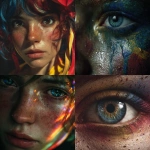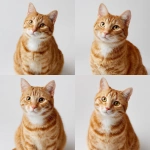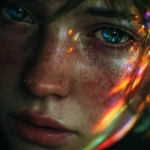Explore the Best AI Image Gallery

Painted Pixels: AI Image Generations Impact on Marketing and the Creative Industry
The world of marketing is undergoing a rapid transformation, driven by the emergence of powerful artificial intelligence (AI) tools. Among these, AI image generation has emerged as a particularly disruptive force, capable of creating stunning visuals at an unprecedented pace and scale. This technology holds immense potential for marketers, designers, and creatives alike, but it also raises important ethical considerations that demand careful attention.
A New Creative Frontier
AI image generators leverage deep learning algorithms to analyze vast datasets of images and learn the patterns and rules governing visual composition, color palettes, and subject matter. This allows them to produce original images on demand, tailored to specific briefs or requirements. Imagine a world where marketers can effortlessly generate high-quality visuals for social media campaigns, website banners, product mockups, and even personalized marketing materials, all within minutes.
Potential Uses in Marketing
- Content Creation: AI image generators can produce eye-catching visuals for blog posts, articles, social media updates, and email newsletters, saving time and resources.
- Product Visualization: Marketers can use AI to generate realistic renderings of products before they are physically manufactured, allowing for virtual prototyping and customer feedback.
- Personalized Marketing: AI can create customized visuals based on user data and preferences, delivering more targeted and engaging marketing experiences.
- Social Media Advertising: Generate unique and compelling ad creatives that capture attention and drive engagement on social platforms.
- Brand Identity Development: Explore new visual concepts and refine brand aesthetics with AI-generated imagery.
Ethical Considerations
While the potential benefits of AI image generation are undeniable, it is crucial to address the ethical implications associated with this technology.
- Copyright and Ownership: Who owns the copyright to images generated by AI? The creator of the algorithm, the user who provides the input, or the AI itself?
- Bias and Representation: AI algorithms are trained on existing data, which can reflect societal biases. This raises concerns about the potential for AI-generated imagery to perpetuate harmful stereotypes.
- Transparency and Accountability: It is important to ensure transparency in how AI image generators work and to establish mechanisms for accountability in case of misuse or unintended consequences.
Future Trends
The field of AI image generation is rapidly evolving, with ongoing research and development pushing the boundaries of what is possible. Here are some key trends to watch:
- Increased Realism and Detail: AI models will continue to improve in their ability to generate highly realistic and detailed images.
- Personalized and Interactive Imagery: Expect to see more AI-powered tools that enable users to customize and interact with generated images, creating truly unique experiences.
- Integration with Other Technologies: AI image generation will likely become more integrated with other technologies such as virtual reality (VR), augmented reality (AR), and the metaverse, opening up new creative possibilities.
Conclusion
AI image generation is poised to revolutionize the marketing landscape, offering unparalleled creative potential while raising important ethical considerations. As marketers, designers, and creatives embrace this technology, it is essential to approach it responsibly, ensuring that it is used for good and that its benefits are shared by all.

](https://images.ai-img.art/thumbnails/150/229d202f0ba192ad857509389a22aa5e3b948a813ee711996ae9d32631b486e0.webp)




](https://images.ai-img.art/thumbnails/150/7c569b0eb6e7eddaf8d96b3e3532d8b0de6a7d79916c0ef333632070a3085997.webp)


](https://images.ai-img.art/thumbnails/150/76d26b409b1a7acfd86a78c5d5047ff9bd7be9ecf55ce838cc2c854bf42c00be.webp)






](https://images.ai-img.art/thumbnails/150/546184a0cbf4b3d07f6ce10e72c0faf2a088fd4aac33c10422c11d76bf734be8.webp)
](https://images.ai-img.art/thumbnails/150/f401da92914cabe9929e88ee4a02fbe744702d0c12dcbbd71efa8cf4cf1a6fee.webp)




](https://images.ai-img.art/thumbnails/150/c064d275c74e06a80b37064ffe83a30913361f0a4602f9a669e8ecbdb37ec6ad.webp)





](https://images.ai-img.art/thumbnails/150/5d3ed451a35bec12705494605ebbe909dc0f4319e9a6064ab824b39609ada54e.webp)

](https://images.ai-img.art/thumbnails/150/912c326dfe63108e4ca5cdcf408c2247b3e7d4afacde8aac324b06a9a4a6913c.webp)




](https://images.ai-img.art/thumbnails/150/8561b450506900783584c556bf57ccab16188eb111ae0b9ec0cc34841b9a6825.webp)
](https://images.ai-img.art/thumbnails/150/fe2cfa6e64066976325cd677ef63e43820c1843dc81bcf90c0b68dc300689e03.webp)




](https://images.ai-img.art/thumbnails/150/e3a2739669e7e25395e2cc5578f479057e60973d76d85724a5758b6e1039ee3c.webp)






](https://images.ai-img.art/thumbnails/150/2055d76bd9940ffa62a06896525d0f07a5b57bbe3b766a043d977b1c678d69c1.webp)
